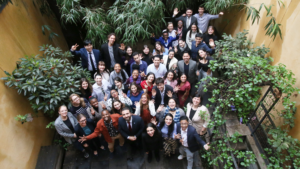Since the 30th of September, WYA has been closely following European Parliament Commissioner Nominee hearings relevant to dignity, the family, and youth. WYA’s interns maintained a presence at some of these hearings, and this article summarises the content of these procedures.
This process allows the European Parliament (EP) to screen the candidates for the highest posts in the new Juncker Commission. The EP must approve the whole college of commissioners and they can veto the executive if they dislike one of the candidates. Given the unlikelihood of this, they may at first seem like “rubber stamp” events. In fact, this is untrue; a Commissioner in the first Barroso administration was forced to resign following the hearing.
These hearings represent the power that the elected legislative (the EP) has over the unelected executive (the Commission), as a symbol of European democracy. They also represent the first, much publicized thrust of these diverse Europe-wide officials into the public sphere. The hearings were more or less packed with journalists and representatives from NGOs, including several WYA interns. Given the relatively charged climate around these auditions, some representatives were received better than others.
WYA’s Jerome Nsanzimana followed the hearing of Marianne Thyssen, Commissioner-Designate for Employment and Social Affairs. He described the atmosphere as fairly laid back, and Thyssen as “eloquent.” When asked how the EU could better support families, she stressed the accurate, and often overlooked, fact that supporting the family is essential for an educated workforce, because education starts within the family.
Whilst conceding that family affairs remains fundamentally a member state competence, she advocated encouraging the member states to foster family friendly policies that bear in mind work-family balance. This is especially worthy of the EU’s attention due to the European-wide demographic crisis. Conditions must be better for families to be confident enough to have more children, and increase the birth rate.
Among the more concrete policies that Thyssen proposed was solving the bureaucratic deadlock on the maternity leave directive. This is essential for both maternal and child health. With a nod to the current impasse between the Parliament and Council on this issue, she acknowledged that an agreement has to be made on the minimum length of maternity leave. She stated her willingness to table the directive again, this time taking father’s leave also into account.
WYA intern Emőke Péter, who speaks Hungarian as one of her native languages, attended Tibor Navracsics’ hearing. As Navracsics was nominated as Commissioner of Education, Culture, Youth and Citizenship, we took an interest to him on several levels. An excellent sentence stood out during his opening statement: “Equality, the rule of law, human dignity, freedom, tolerance, solidarity are those values of the EU to which I am also personally committed.” Like Thyssen, he acknowledged the tremendous relevance of modernising the educational system to foster a sustainable economy.
He gave five convincing proposals for European Youth that are noteworthy:
- Education for growth and jobs;
- Promoting cultural diversity as the vehicle of competitiveness and a source of innovation;
- Ensuring European university students to become better prepared for their studies and keeping the highly successful Erasmus fund;
- Working together with Commissioner for Employment and Social Affairs for the establishment of new partnerships between universities and universities and businesses;
- Listening to the voice of young citizens, including the creation of a platform that reaches at least one million young people;
Other key aspects of his speech focused on education as a tool for combating racism and emphasizing childhood education in a more effective way. He proposed the expansion of the European Voluntary Services, which allow European Youth to volunteer in other countries in a spirit of solidarity.
Ben Phillips attended the hearing of Vĕra Jourová of the Czech Republic. Jourová is the Commissioner-Designate for Justice, Consumers and Gender Equality. She gave reassuring statements about anti-discrimination measures and reaffirmed her commitment to slashing red tape around such issues several times.
The Juncker Commission has been one of the most important and scrutinized since the commission’s inception. The reason for this is partially due to the huge youth and family crises that Europe must now tackle: high unemployment, an increasingly disengaged young population, and smaller and more broken families.
Despite these facts, the protection and promotion of Human Dignity was only present in the hearing of Marianne Thyssen, Commissioner-Designate for Employment and Social Affairs, but only as a secondary subject. This is why it is important for WYA Europe to maintain a constant presence at the EP, and make both parliamentarians and public aware of the serious issues at stake. We look forward to continuing our activities and hope that the new Commissioners address the concerns of European youth through policies that respect human dignity.
By: Ben Phillips, intern at World Youth Alliance Europe.








